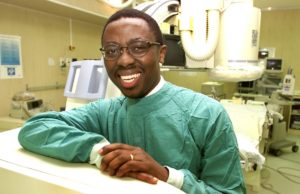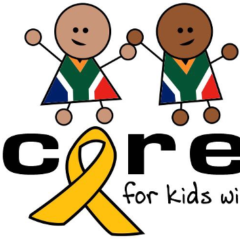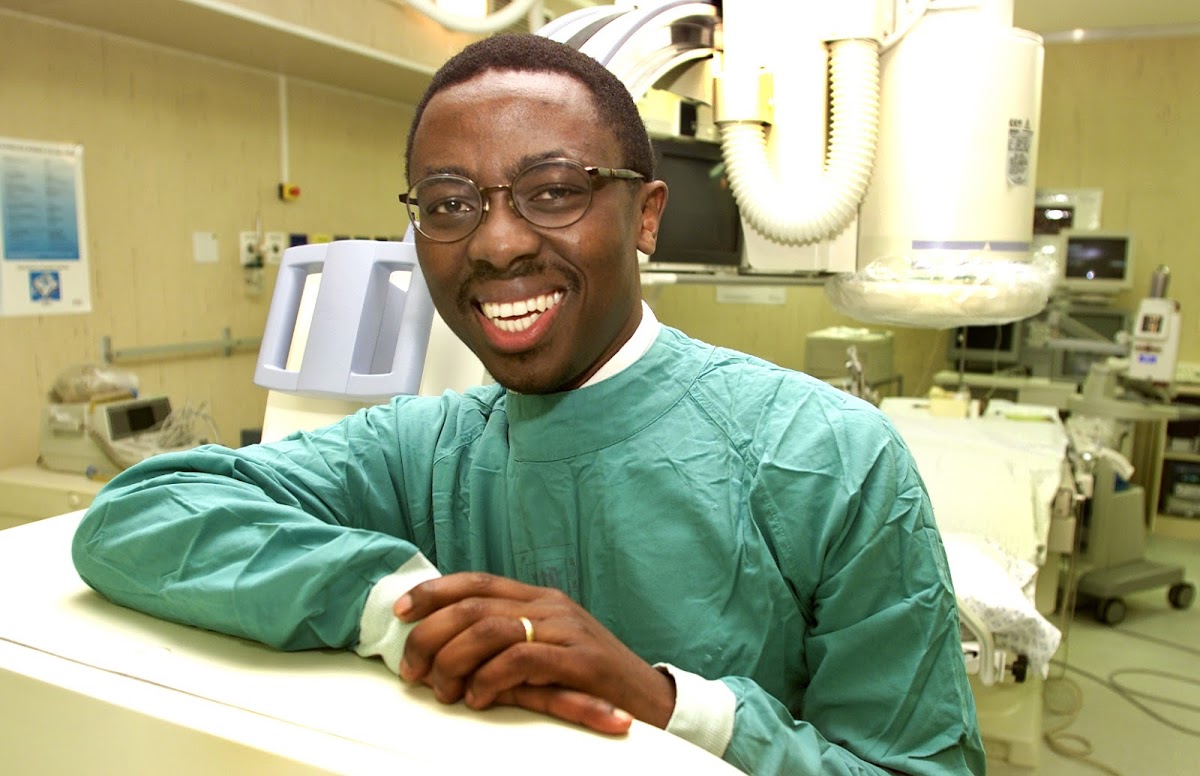Bongani Mayosi, Dean of the UCT Medical Faculty, took his own life a couple of days ago. The first reports said that he had had a heart attack, and Twitter lit up with the irony of a cardiologist dying of a heart attack. Then his family released the details that he had died by suicide. Perhaps in a way, it was his heart that killed him. Perhaps his heart couldn’t take any more pain. The medical world is shocked and saddened. It seems no one saw this coming. Our country has more visible stellar young and middle aged black professionals than ever before and they lead and inspire, and yet they are under enormous pressure. Did this pressure contribute to his death by suicide? I don’t know and most of what follows is speculation and conjecture but I feel I have to put metaphorical pen to paper because I feel the medical profession in at breaking point.
Prof Mayosi was only 51 and yet he managed to rise to the top – he was a well-respected cardiologist who grew up in Mthatha, where I did my community service year. My view of the place is very limited – I lived in doctors’ accommodation with mainly white people, all of us from out of town and some from out of country. We hardly mixed with the local population and there were very few local black doctors there. Prof Mike Nazo was one, and I mourned when he, too, died at a relatively young age. I have no idea what it was like to grow up young and black in a place like that, with extremely limited infrastructure, crippling corruption, eroded land and poverty everywhere. I have never seen so much malnutrition as I saw in my year there. Even now my brain conjures up the paediatric outpatient department and I can vividly recall the smell – diarrhoea, old Vaseline and ammonia-soaked cloth nappies.
Now, Prof Mayosi was a little different – his parents were professionals and he did not grow up in grinding poverty, but I imagine it touched him and I speculate that he felt some responsibility to the community which surrounded him as grew up. He grew up and he got out and he landed up in Cape Town, one of the most segregated cities in our country.
His family bravely released details of his battle with depression which they said lasted only two years, which corresponds roughly with the time when he was appointed Dean of the Faculty of Medicine. How very, very sad that at the peak of his career, he felt wretched enough to leave this world. I didn’t know him but I knew of him and I have communicated with friends who are devastated by his death. Devastated because some of them, too, have battled with this demon. Devastated because he was a leader who inspired the people coming up after him – they saw that he made it and it gave them hope that they could do it too. And now, that hope is gone. He was not who they thought he was. He was desolate, inconsolable and out of touch with reality. People forget that true depression is a form of psychosis, meaning the person is out of touch with the reality of their life.
The reality as we see it was that he had succeeded in a very difficult career, in a very difficult setting. He had a wife and children. His wife is a professional woman. He had friends and colleagues and allies. He had a roof over his head and interesting work. What more could a person ask for? And yet, amongst all of this abundance, I imagine he felt lonely and more than sad. He didn’t feel good enough to stay with us.
How many doctors don’t feel good enough? I would hazard a guess and say most of us. It’s the way we’re taught and it’s what the community tells us. These are some of the pressures from our colleagues in academic medicine:
- We MUST NOT make mistakes. Mistakes kill people. (I had a colleague in London who used to say, arrogantly, to the people who weren’t doctors, “You do your job so badly. If I did my job that badly, people would die”.)
- We must not get sick – no days off, no sniffling at work, no feeling sorry for ourselves. (Once, years ago, a patient’s mother asked me to explain something to her for the third time. I should have been at home as I had bad gastroenteritis but there was no way I could take a day off work. I told that I couldn’t explain yet again as I had to rush to the toilet. She reported me, and there was no sympathy from my senior. One colleague developed a kidney stone from not having time to eat and drink and pee, and I know of two more who had severe pneumonia and finished their shifts while being hypoxic.)
- We must be compassionate towards our patients but not TOO compassionate. Feel free to comment on how to draw that line.
- We must publish, if we are in the academic sector. And anyone who has gone through the process of submitting a Master’s, a PhD or a medical article, will tell you just how grueling that process is. And we do it over and over again. Prof Mayosi had co-authored more than 250 articles in peer-reviewed journals, so had been battered more than 250 times by “peers” who tell themselves that they are keeping standards high, but sometimes they are just bitter and cruel and that comes through in reviewers’ comments.
- We must lead in the field. And Prof Mayosi was the chair of this and the head of that – so many top positions. From what I have seen over the last decade or so, every time someone reaches a top position, there is someone else saying they didn’t deserve it, someone who thinks they should have been there or someone who was just plain jealous because they know they’ll never quite get there. Maybe he was so amazing that no one ever said those things, and maybe the voices of dissent were just in his head. But they’re louder when they’re in your own head.
- We must teach and mentor. Now, teaching and mentoring is fun and stimulating and rewarding. It’s a bit like growing a child up but they’re old enough to wipe their own bums, but sometimes they demand parenting. And when you are tired from parenting your own children, and marshalling your own inner child, sometimes you just don’t have the energy to give students and junior staff what they demand. And boy do millennials demand! Perhaps there were demands on Prof Mayosi that he felt he should be able to help with but he just didn’t always have the reserves.
- We must not get depressed. Apparently, depression affects one fifth of the population. Care to guess how many doctors have been or are depressed? Some reports say three quarters or more. And yet, I know of only two colleagues who have openly admitted to being depressed. And do we support them? Do we say, “Take a mental health day, I’ll cover your ward”? Do we go gently on them? No, we do not. Many of us are so stretched and tired that survival mode is all we can manage. We judge them, we speak about them behind closed doors, we wish they would just buck up because we’re also tired and miserable, and perhaps even depressed. But god forbid that we should admit to depression. Depression is for weak people and we all know that doctors are strong – we’re the cream of the crop, the educational elite, we’re tough – we do shifts of 36 hours, we don’t need to eat or pee for 12 hours straight, we can function in the war zone that is medicine in South Africa. There is no time for weakness, for depression, for introspection.
And these are some of the demands from our communities:
We must always be available. Doctors should be super heroes, have an open-door policy all the time, never be tired, not be impatient, always have a smile on our faces (and all the media pictures of him show a wide open, sunny smile).

- We must always be happy and smiling. Whether we’re happy inside or not. There is no tolerance for a bad mood, a bad day, a sad day – people call it professionalism and bedside manner but I call it lack of humanity and unrealistic expectations. Doctors are people too, and people first. I know – novel concept, right?
- We must provide holistic medicine. This means, treating the whole patient – physical, spiritual, financial. The patient, the family, the community. In paediatric oncology, this means treating the child in front of us who has a life-threatening illness, dealing with the siblings who are neglected in the face of cancer, helping the parents with their shock and grief for the life they had which will never be the same again, applying for financial assistance. Speaking to parents’ employers, consulting the multidisciplinary team, answering questions from concerned and often aggressive family members, mediating all sorts of conflicts… I only know paediatric oncology but I imagine cardiology has similar and equally intense stressors. And who is looking after the whole doctor? And where do we learn holistic practice? Certainly not the medical schools I know.
- We must be up to date with the latest research. Because our patients can now Google everything and fact-check us as we go. I love the Googlers because sometimes I learn something new, and patients get news from other sources which I can then verify or not. But it does mean you have to be on your A game all the time.
- We must deal with the politics of the day which impacts on our work. This includes race politics, corruption, party politics, inequality – all of these things make our patients sick or stop them from getting fully better. And that is soul-destroying.
Every time I lose someone to suicide I am devastated. Some of the most beautiful, pure, hard-working people I know have taken themselves off this earthly plane. All the ones I know have been exemplary humans, loving people who led good lives. And somehow they didn’t feel they deserved to be here, to take up space, to breathe the oxygen we all have a right to. They didn’t see the reality that we saw – that they were good people who deserved to be alive.
We need to end the stigma around mental illness right now. We are human, we are flawed and sometimes we fail. There is no shame in feeling depressed or anxious or having any other mental illness. It can’t be cured by snapping out of it, being stronger, counting our blessings or going for a walk. Depression is a real illness which needs real treatment and compassion – statistically most of us are at risk so let’s work on this for ourselves as well.
I grieve for Prof Bongani Mayosi’s family, for his wife and children, his colleagues and friends. I grieve for all the people who were inspired by him and now feel a bit lost. May his soul rest in peace.
If you are feeling desperate or depressed, please reach out. These are the details of the South African Depression and Anxiety Group:
To contact a counsellor between 8am-8pm Monday to Sunday,
Call: 011 234 4837 / Fax number: 011 234 8182
For a suicidal Emergency contact us on 0800 567 567
24hr Helpline 0800 12 13 14

